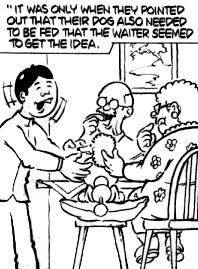Legend: Tourists who send their dog to a Chinese restaurant's kitchen to be fed end up being served their own pooch.
Example: [Reuters, 1971]
Zurich — A Swiss couple fled home from Hong Kong after their pet poodle, Rosa, was cooked and served to them garnished with pepper sauce and bamboo shoots at a Chinese restaurant. Hans and Erna W., who asked the Zurich newspaper Blick not to publish their full names, said they took Rosa with them to the restaurant and asked a waiter to give her something to eat. The waiter had trouble understanding the couple but eventually picked up the dog and carried her to the kitchen where they thought she would be fed. Eventually the waiter returned carrying a dish. When the couple removed the silver lid they found Rosa. They told the paper they suffered nervous collapse and returned to Zurich immediately. |
Variations:
- Our "poached pooch" tale has been set in Hong Kong, "somewhere in Asia," and surprisingly often "at a Chinese restaurant" (with further implications that the incident takes place in a Western community).
- The owners are said to be an American, Swiss, or English couple. (Apparently, this fate never befalls the critter of someone dining alone.)
- The dog is inevitable one of the smaller breeds; usually a poodle or chihuahua.
- The description of how the dog is served is often given loving attention by the narrator:
- under glass.
- with pepper sauce and bamboo shoots.
- roasted, with an apple or orange in its mouth.
- garnished with sprigs of parsley in the dog's ears.
- on a bed of rice.
- its jeweled collar in its mouth.
Origins: Despite the Reuters cite given above, it's doubtful this legend ever played out in real life.

(Even the wire services get taken into running an urban legend on occasion, as was the case here.)
Asian cooking traditionally involves little or no meat. When meat is incorporated into a dish, it's cut up into small chunks and mixed with vegetables or noodles. Frugality lies at the heart of this practice, which stretches less of an expensive item (meat) into going further in feeding the family. Therefore, though the plot point of a tourist's dog being turned into that person's dinner still lies within the realm of possibility, any notion that the unfortunate critter would be served up in recognizable form should be tossed out the nearest window. The owners might eat dog (even their own dog!) but they wouldn't know it until the meal was over and they asked for their pooch back.
So, forget about horrifying mental images of Fifi being served up on a platter with an apple it its mouth — it just couldn't happen. (Fifi might end up in a stir-fry, though.)
Which brings us to the "why" of the legend: mistrust of foreigners (particularly Asians) and their irredeemably foreign ways. One of the obvious stumbling blocks sitting square in the middle of the road between Asian and Western understanding is each culture's opposing attitude towards cats and dogs. With few exceptions (and most of those coming from the farming communities), Westerners see these critters primarily as companions. Though some cats and dogs
may actually "work" (e.g., mousing, guarding), those functions are still regarded as secondary to what is perceived as these animals' mission in life; being valued members of the family.
By contrast, Asian society views these creatures as unproductive and thus as having little intrinsic value. In cultures where sustenance has traditionally been scarce and food could not be squandered on animals that didn't earn their keep, pet keeping doesn't develop the same way it does in wealthier environments. Look for people living in poverty-line cultures to keep birds (ever hear the saying "She eats just enough to keep a bird alive"?), insects (e.g., crickets), or some other small animal that consumes very little.
Asians don't share Western reverence for cats and dogs because they are unused to thinking of Muffy and Fido as pets. This difference of viewpoint underpins stories playing on the theme of heathen foreigners regarding treasured Western pets as nothing more than foodstuffs. It's this bit of xenophobia which fuels nasty rumors about Chinese restaurants' rounding up local cats to turn into chop suey and Koreans being responsible for dog disappearances in any neighborhood they move into. (Arch prankster Joey Skaggs had a fine time playing upon Western sensibilities in his Korean dog soup hoax.)
Barbara "rumors that dog Asians" Mikkelson
Sightings: Stephan the luckless pet frog comes to a end in television's Ally McBeal ("Happy Trails," original air date
An even older appearance of the legend occurs in the 1975 Italian comedy Fantozzi in which the central character takes the gal he is trying to impress to a Japanese restaurant, then hands her pet Pekinese to a waitress while asking it be fed in the kitchen while the couple dines. As expected, later in the meal the dog is set before them on a covered silver platter, roasted whole with a slice of orange in its mouth. The head waiter then ceremoniously presents the distraught dog owner with the pooch's collar. A clip of this scene can be viewed here.
Last updated: 17 May 2010
 Sources:
Sources:
 Also told in:
Also told in:
